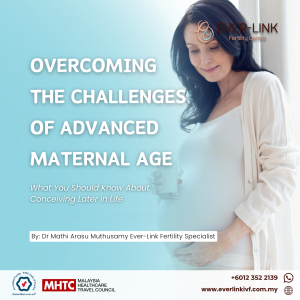
The journey to parenthood is deeply personal, for many women decision to have children comes later in life. If you’re over 35 and considering starting or your family, you may have heard the term advanced maternal age (AMA). While this phrase may sound concerning, advancements in fertility care have made it possible for many women to successfully conceive and have healthy pregnancies.
In this blog, we’ll break down what advanced maternal age means, how it impacts fertility, and the options available to support your journey to parenthood.
What Is Advanced Maternal Age?
Advanced maternal age refers to women who are 35 years or older at the time of pregnancy. While age is just a number, it does play a significant role in fertility, because:
- Women are born with a finite number of eggs, and the quantity and quality of eggs decline with age.
- After 35, the risk of chromosomal abnormalities in eggs increases rapidly.
- Medical conditions such as high blood pressure or diabetes, which can affect pregnancy, are more common as women age.
- Increase incidence of gynaecology conditions such as endometriosis and adenomyosis, adversely affecting pregnancy.
Despite these challenges, many women over 35 have healthy pregnancies with the right support and care.
How Does Age Affect Fertility?
Fertility naturally declines with age due to biological factors, including:
- Egg Quantity: The number of eggs in the ovaries decreases over time.
- Egg Quality: The likelihood of genetic abnormalities in eggs increases, which can lead to difficulty conceiving or a higher risk of miscarriage.
- Hormonal Changes: Hormonal shifts can affect ovulation and the ability to conceive.
While these factors are natural, they don’t mean that conceiving after 35 is impossible. With the right guidance and treatment, many women can achieve their dream of parenthood.
Options for Women of Advanced Maternal Age
If you’re trying to conceive and are concerned about age-related challenges, there are several options to consider:
- Fertility Testing
Fertility assessments can help you understand your ovarian reserve (egg count) and overall reproductive health. This is an important first step in creating a tailored fertility plan.
- Assisted Reproductive Technologies (ART)
- In Vitro Fertilization (IVF): IVF involves fertilizing an egg with sperm in a laboratory and transferring the resulting embryo into the uterus.
- Egg Freezing: If you’re not ready to conceive yet, freezing your eggs can preserve their quality for future use.
- Donor Eggs
For women with significantly diminished ovarian reserve, or multiple unsuccessful IVF with own eggs using donor eggs is a viable option. These eggs are typically from younger donors and have a higher success rate.
- Lifestyle Changes
Maintaining a healthy lifestyle can improve fertility and pregnancy outcomes. Focus on:
-
- Eating a balanced diet
- Exercising regularly
- Managing stress
- Avoiding smoking and excessive alcohol consumption
Risks and Considerations
While many women over 35 have successful pregnancies, it’s important to be aware of potential risks, including:
- Higher Risk of Miscarriage: Due to chromosomal abnormalities.
- Gestational Diabetes: More common in older mothers.
- Pre-eclampsia: High blood pressure during pregnancy.
Close monitoring and a proactive healthcare plan can help mitigate these risks and ensure a safe pregnancy.
Why Choose Ever-Link Fertility Centre for Your Journey?
At Ever-Link Fertility Centre, we specialize in helping women of all ages achieve their dream of parenthood. As a Malaysia leading Fertility Centre we offers personalized care and advanced fertility treatments tailored to your unique needs. Whether you’re just starting your journey or exploring options like IVF or egg freezing, we’re here to guide you every step of the way. Advanced maternal age doesn’t have to be a barrier to starting or growing your family. With the right support and modern fertility treatments, women over 35 have more options than ever before.

